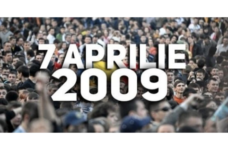On 30 October 2018, the European Court of Human Rights (ECtHR), in case O.R. and L.R. v. Republic of Moldova (application no. 24129/11), found violation of the Art. 3 of the European Convention on Human Rights (ECHR) due to length of investigation of the April 2009 ill-treatment that took place in at the Chişinău General Police Commissariat. The ECtHR also found that the sanctions applied on police that applied ill-treatment were too mild.
The case concerns two young women arrested by the police on 7 April 2009. They were taken to the Chișinău General Police Commissariat and forced by policemen to strip naked in front of a male police officer and make sit-ups. Prosecutors have started a criminal case against three policemen only 9 months later. One of the police officers was subsequently stripped of criminal charges on the grounds that his actions constituted administrative contravention. The other two officers were sentenced for ill-treatment to 5 years of suspended imprisonment.
The ECtHR found that the investigation was not prompt. The criminal investigation was started after 9 months from the date when the information about the offense became public. Prosecutors did not react to this information and waited for the applicants’ complaint. The ECtHR reiterated that when an authority suspects a treatment contrary to Art. 3 of the ECHR, it must react ex officio.
The ECtHR considered that the sanctions imposed to the police officers were incompatible with the obligation to prevent ill-treatment. The judges sanctioned the two police officers with the minimum sanction prescribed by the law (5 years of suspended imprisonment). The judges invoked that accused`s behavior was determined by aggression of police officers by protesters on 6 April 2009. Article 3 of the ECHR does not allow exceptions, even in the most extreme circumstances. The attempt of the Chișinău Court of Appeal to justify the minimum sanction applied to police officers by the fact that they were acting in a situation of mass disorder is regrettable. In fact, by suspending the enforcement of the imprisonment, the police officers were de facto exempted from any criminal liability. Moreover, during the proceedings, police officers were not suspended. The ECtHR also noted with concern that the indulgence towards the police officers accused of ill-treatment was not an isolated incident. The statistics for the years 2011 and 2012 suggest a general tendency of the Moldovan courts to protect state’s agents accused of ill-treatment.
The third policeman, accused of the applicants’ threat with using violence, was stripped of any criminal charges on the ground that his deed was an administrative offense (exceed of the duties). The administrative charges were also discontinued because the statutory time limitation expired. Judges refused to annul the prosecutor’s decision to discontinue the criminal proceedings on the grounds that it would violate the principle that no one could be repeatedly punished for the same deed (Article 4 of Protocol 7 to the ECHR). The ECtHR found that, given the context in which the threat occurred, it amounted to inhuman and degrading treatment. Prosecutors and judges have not motivated in any way why the deeds of the third policeman are contravention and not crime (Article 328 of the Criminal Code), even though the applicants have explicitly invoked this argument. Prosecutors were aware that, by discontinuing criminal charges, they exonerate the police officer of any liability, which is incompatible with the obligation to prevent ill-treatment. Interpretation of the prohibition to be repeatedly held liable for criminal offence, given by judges, is incorrect. This prohibition only refers to situations that have become “final”. In the present case, there is no prior final decision to be held accountable.
The ECtHR granted each applicant EUR 7,500 in costs and expenses and the total sum of EUR 1,500 for legal expenses. The applicants were represented before the ECtHR by Mr Vladislav GRIBINCEA, Executive Director of the Legal Resources Centre from Moldova.

